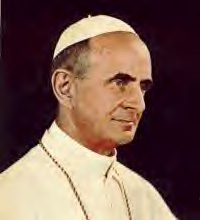 Giovanni Battista Montini was born in Brescia, Lombardy, on September 27,
1897. His father was a successful journalist and a member of the Italian
Chamber of Deputies. As a young man the future pope had such poor health
that he was allowed to attend the seminary as a day student. He was
ordained at Brescia on May 29, 1920, and sent to Rome for further studies.
Having entered the papal diplomatic service he was sent to Warsaw as
secretary to the nuncio. His health failed and he returned to Rome, where
he was assigned to the secretariat of state.
Giovanni Battista Montini was born in Brescia, Lombardy, on September 27,
1897. His father was a successful journalist and a member of the Italian
Chamber of Deputies. As a young man the future pope had such poor health
that he was allowed to attend the seminary as a day student. He was
ordained at Brescia on May 29, 1920, and sent to Rome for further studies.
Having entered the papal diplomatic service he was sent to Warsaw as
secretary to the nuncio. His health failed and he returned to Rome, where
he was assigned to the secretariat of state.
By 1937 he was under secretary, and by 1952 acting secretary, of state.
During World War II he was in charge of the Vatican's work for refugees and
prisoners of war. He was there all during the occupation of Rome when there
was a real danger the Germans would take the Pope and his chief aides with
them when they were driven north. On December l, 1954, Pius XII made him
Archbishop of Milan, the largest and, after Rome, the most important
diocese in Italy.
Since Pius XII made no cardinals after 1953, the Archbishop of Milan was
not a member of the conclave of 1958; but he was one of the first cardinals
made by John XXIII in December of that year. He played a prominent role in
the Council and since he was clearly the favorite of John XXIII, his
election as his successor (June 21, 1963) was almost taken for granted.
The pontificate of Paul VI will always be linked with the Council. His was
the task of bringing it to a successful conclusion (December 8, 1965) and
of starting, though he knew he could not finish, the implementation of its
decrees. One of its major themes was collegiality, or the collective
responsibility of all the bishops, under the pope, for the general welfare
of the Church. He wished to govern with and through the various national
episcopal conferences. He was determined to hold firmly to basic Catholic
teaching on faith and morals and to allow any other changes circumstances
might suggest. Since conditions vary greatly from place to place and some
people had unusual notions of the changes the Council had intended, there
was some confusion about what could be done.
He will be remembered for his work toward the reunion of all Christians,
his reaching out to the immense multitudes who belong to non-Christian
religions or to none, his internationalizing the Roman Curia, and his
untiring work for peace. He was deeply interested in the emerging nations
of the Third World and supported every effort for their social advancement.
He was the first pope to visit every continent, and the first since St.
Peter to visit the Holy Land. The first papal visit to the Western
Hemisphere was his visit to the United Nations Headquarters in New York on
October 4, 1965. His attempt to establish better relations with communist
governments had few results and aroused mixed feelings in various Catholic
circles. His exceptional capacity for work lasted to the end, which came
quite suddenly on August 6, 1978.
Excerpted from "Popes
Through the Ages" by Joseph Brusher, S.J.

